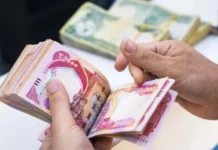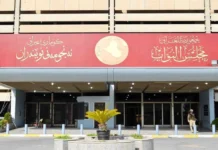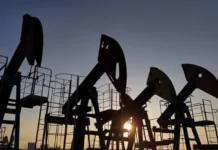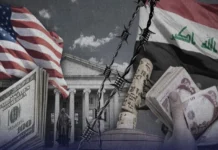Tishwash: Iraq awaits a trade delegation from the United States. These issues will be raised at the meeting.
Iraq awaits the visit of a high-level US trade delegation comprising representatives from the US Department of Commerce and a number of major US companies operating across various economic sectors, as part of efforts to strengthen economic and trade relations between the two countries.
The Prime Minister’s Advisor for Foreign Relations, Farhad Ala’aldin, indicated that a high-level trade delegation from the United States will visit Iraq this week to strengthen economic and trade relations between the two countries.
Alaa El-Din said, “The visit aims to discuss investment and cooperation opportunities on priority strategic projects in Iraq, strengthen partnerships between the private sectors of the two countries, expand trade exchange, and transfer technical and technological expertise, all in a way that serves Iraq’s economic development goals.”
According to the Prime Minister’s Advisor, the delegation includes representatives from the US Department of Commerce and a number of major US companies operating in the energy, infrastructure, technology, financial services, industry, healthcare, and general trade sectors, as well as representatives from the US Chamber of Commerce.
Alaa El-Din considers the US trade delegation’s visit a clear indication of American companies’ confidence in Iraq’s investment environment, while also representing a practical step toward developing bilateral economic relations.
Alaa El-Din added, “The visit will contribute to opening new horizons for cooperation, especially in sectors that the Iraqi government seeks to develop, such as energy and renewable energy, digital transformation, and banking services.”
Alaa Al-Din emphasizes that despite the challenges facing the region, economic relations between Iraq and the United States are based on strategic foundations and mutual interests. He notes that the Iraqi government is working to protect its economic interests and ensure a stable business environment, thus maintaining the smooth flow of cooperation with all international partners, most notably the United States.
On October 27, Iraqi Foreign Minister Fuad Hussein, while chairing the regular meeting of the Higher Coordination Committee for the Strategic Framework Agreement between Baghdad and Washington, emphasized the importance of strengthening relations with the United States and moving towards a solid economic partnership.
Hussein stressed the need not to focus solely on military and security aspects, but rather to expand cooperation to include economic, health, educational, and environmental fields.
Iraqi-American relations are governed by the Strategic Framework Agreement, which Iraq signed with the United States in 2008. Both sides began implementing its provisions in 2009. The agreement includes 11 articles covering diplomatic, political, security, economic, and cultural areas, and stipulates long-term relations between the two countries based on the principle of sovereign equality, rights, and shared interests. link
*************
Tishwash: The budget is awaiting its launch. No political obstacles stand in the way.
MP Salem Ibrahim confirmed, on Saturday (April 5, 2025), that there are no political forces or blocs obstructing the sending of the 2025 general budget tables, expecting that the tables will be sent to Parliament during the next week or the week after, according to current data .
Ibrahim told Baghdad Today, “There is a clear delay in sending the budget tables, amid increasing parliamentary pressure on the government to expedite its referral to the parliamentary finance committee for discussion, in preparation for submitting it to the parliament presidency and then presenting it for reading and voting in accordance with established constitutional procedures.”
He explained that “all political forces support the approval of the budget, and there have been no indications of any party seeking to obstruct or disrupt the schedules, given the urgent need for the budget to secure the entitlements of governorates and various social groups, in addition to the financial obligations that depend on its approval .”
Ibrahim warned that “the continued delay in submitting and approving the budget will directly harm project funding and the implementation of financial plans in various governorates,” stressing that “approving the budget has become a national option supported by all political parties without exception .”
The MP concluded his statement by saying, “There are no attempts to postpone the schedules until the next parliamentary session. All we are waiting for is the timing of the government’s submission .”
The state’s general budget is one of the fundamental pillars of financial and economic management in Iraq. The government relies on it to finance development projects, provide services, pay salaries, and fulfill social obligations to various segments of society .
With the adoption of the first three-year budget in 2023, many hoped the delays would be shortened, but the detailed annual schedules still need to be submitted, discussed, and voted on by Parliament .
These statements come at a time of mounting parliamentary and popular pressure on the government to expedite the release of schedules, amid a growing need to activate stalled projects and disburse dues to governorates, employees, and contractors, amid mounting economic and financial challenges link
*************
Tishwash: 95 trillion dinars are held outside the banking system. What is their impact on the economy?
Prime Minister’s advisor, Mazhar Mohammed Saleh, confirmed on Saturday that the widespread use of digital payment systems allows citizens to borrow at lower costs, noting that 95 percent of the country’s 109 trillion dinars are held outside the banking system.
“The positive steps towards activating e-commerce are aligned with the government’s and the Central Bank’s efforts to integrate hoarded funds (cash leakage) into the banking system, which will contribute to strengthening the national economy and achieving financial stability,” said Mazhar Mohammed Saleh, an advisor to the Prime Minister.
He pointed out that “the Monetary Authority had previously prepared regulations and registration procedures to obtain a license to practice this trade, in a coordinated manner that contributes to regulating the market and enhancing consumer confidence.”
He added, “The government and Central Bank’s steps to enhance confidence and activate e-commerce are in line with the launch of digital transformation projects. This has been the case since the Central Bank announced the launch of strategic projects to support digital transformation, including the instant payments project, local cards, and unified payment gateways, all of which aim to enhance financial inclusion and facilitate digital banking operations.
He pointed out that “all measures to address information technology and integrate it into digital payment systems are in line with the country’s digital renaissance, the community’s financial culture, and the development of monetary behavior in relation to inherited customs, traditions, and cultures. Hoarding money at home instead of depositing it in banks remains a prominent economic challenge in Iraq.”
He explained: “Estimates indicate that approximately 87% of the money supply, or approximately 95 trillion dinars out of a total of 109 trillion dinars, is held outside the banking system, preventing a significant portion of the nation’s wealth from effectively participating in the economy.”
He explained that “the more digital payment systems are used, including e-commerce, the more efficient banking activity becomes and the fewer leakages outside banks. This gives official and licensed banking units the greatest opportunity to extend more credit or lend to citizens at a lower cost and with greater efficiency, thanks to the often lower interest rate.”
He noted that “the parallel market for usurers, which deals with funds circulating or hoarded outside the banking system, is a very dangerous, illegal, and costly market for citizens and the national economy in terms of engaging in credit operations or lending at very high usurious interest rates, or what is known as the usurers’ market, due to the ambiguity of its operations.
In addition, some of its activities conflict with the Anti-Money Laundering Law due to the lack of transparency in financing and the absence of governance elements, accompanied by trading and recovery risks.” link





